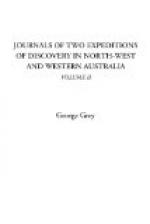12. To punish the aborigines severely for the violation of laws of which they are ignorant would be manifestly cruel and unjust; but to punish them in the first instance slightly for the violation of these laws would inflict no great injury on them, whilst by always punishing them when guilty of a crime, without reference to the length of period that had elapsed between its perpetration and their apprehension, at the same time fully explaining to them the measure of punishment that would await them in the event of a second commission of the same fault, would teach them gradually the laws to which they were henceforth to be amenable, and would show them that crime was always eventually, although it might be remotely, followed by punishment.
13. I imagine that this course would be more merciful than that at present adopted; namely, to punish them for the violation of a law they are ignorant of, when this violation affects a European, and yet to allow them to commit this crime as often as they like when it only regards themselves; for this latter course teaches them not that certain actions, such, for instance, as murder, etc., are generally criminal, but only that they are criminal when exercised towards the white people, and the impression consequently excited in their minds is that these acts only excite our detestation when exercised towards ourselves, and that their criminality consists not in having committed a certain odious action, but in having violated our prejudices.
14. In the vicinity of towns where there is a certain judicial force, and where, on account of the facility of obtaining food, the natives always congregate, it would, by a steady and determined line of conduct, be comparatively easy to enforce an observance of the British laws; but, even partially to attain this object in the remote and thinly settled districts, it is necessary that each colony should possess an efficient mounted police, a portion of whom should be constantly in movement from district to district, whilst another portion, resident in a central situation, should be ready to act instantly in any direction where their presence was required. I do not apprehend that this body need be numerous, for their utility would depend more on their activity and efficiency than on their numbers. It is absolutely necessary, for the cause of humanity and good order, that such a force should exist; for so long as distant settlers are left unprotected and are compelled to take care of and avenge themselves, so long must great barbarities necessarily be committed; and the only way to prevent great crime on the part of the natives, and massacres of these poor creatures as the punishment of such crimes, is to check and punish their excesses in their infancy: it is only after becoming emboldened by frequent petty successes that they have hitherto committed those crimes which have drawn down so fearful a vengeance upon them.
15. The greatest obstacle that presents itself in considering the application of the British laws to these aborigines is the fact that, from their ignorance of the nature of an oath, or of the obligations it imposes, they are not competent to give evidence before a court of justice; and hence in many cases it would be extremely difficult, if not impossible, to obtain evidence on which a prisoner could be convicted.




